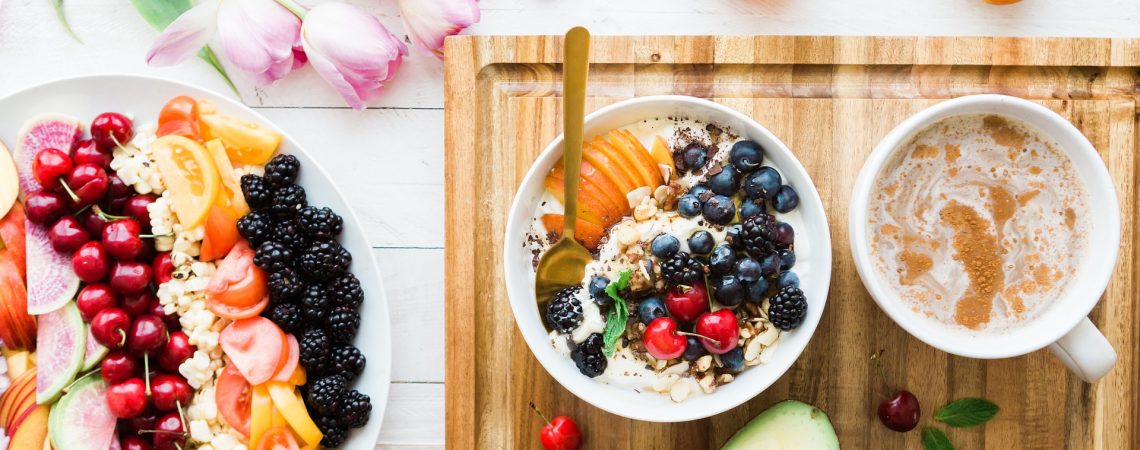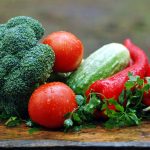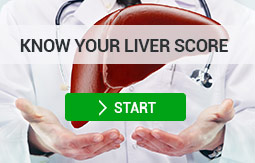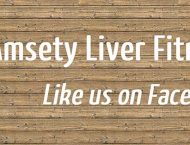What’s in this article?
- Eat breakfast
- Drink more water
- Shrink your portions
- Eat lots of fruits and vegetables
- Eat a variety of foods
- Add flavor to plain healthy food
- Don’t feel guilty for occasional unhealthy treats
Healthy Eating Habits for Improved Liver Health
You don’t have to make big, bold changes to eat healthy. Often, small continuous changes in your eating habits can have a large impact on your health, including increased energy levels, improved mood and the prevention of liver diseases. Read our article to learn about seven healthy eating habits that can improve your liver health and quality of life.
7 Healthy Eating Habits
- Eat breakfast
Eating breakfast can provide a large amount of the day’s total nutrient intake, reduce fatigue, increase energy levels, improve mental performance and help with weight loss. Studies have shown that people who eat breakfast are less likely to overeat and indulge in foods high in cholesterol, saturated fats and refined sugars. In addition, eating breakfast activates diet-induced thermogenesis, a metabolic process that occurs during food consumption and increases the number of calories your body burns to produce heat. For a healthy breakfast, try a dark chocolate champion bowl, banana oatmeal muffins with cinnamon maple, or a broccoli spinach frittata.
- Drink more water
Water makes up almost 70% of the human body and serves as the body’s transportation system. It is recommended to drink at least eight 8-ounce glasses of water each day for optimum health. How much water you should drink exactly depends on factors like your age, gender, height, weight and fitness level. If you exercise regularly, you should drink even more water. Drinking water can boost metabolism, help your liver break down fat, energize muscles, improve digestion, remove toxins, fight against kidney stones and give you healthy, glowing skin.
- Shrink your portions
According to an article published in The Guardian, portion sizes in the US have continued to expand over the years. For example, a study found that in the best-selling book, “Joy of Cooking,” 14 out of 18 recipes repeatedly published from 1936 have doubled in calories. Even if you are eating healthy portions, it is important to downsize. Eating large portions makes us gain weight, which can result in health conditions and diseases like Heart Disease, Diabetes and Fatty Liver Disease. Studies show that we eat less when we use smaller plates and still feel full. Avoid going back for seconds and don’t be afraid to ask for a smaller portion at a restaurant.
- Eat lots of fruits and vegetables
The Harvard T.C. Chan School of Public Health states eating lots of fruits and vegetables can reduce risk of cardiovascular disease, prevent some types of cancer, lower blood pressure, improve digestion, decrease the chances of having eye problems and help with weight loss. The USDA‘s Dietary Guidelines recommends adults to eat between five to 13 servings of fruits and vegetables each day. Keep fruits and vegetables in plain sight ─ Google moved their fruit bowl to the front of the cafeteria and in one month, employees increased fruit intake by two-thirds.
- Eat a variety of foods
Different foods offer different nutrients and to receive as many as possible, it is important to eat a varied, well-balanced diet. This means eating a variety from each of the five food groups (grains, vegetables, fruits, protein and dairy) in the recommended servings daily. Examples of serving sizes include: one medium orange, ¼ cup muesli, ½ cup of ricotta cheese, 80 grams of cooked chicken or ½ cup of cooked vegetables. If you have kale salad for lunch one day, change it up and try butternut squash soup the next day. Not only will you receive more nutrients, you are less likely to get bored of your meals! If you are short on time and need a healthy snack, try Amsety bars. Made from high-quality, vegetarian, kosher and 100% organic ingredients, the bars contain Super 16™, a nutrient-packed mix made from 16 plant-based vitamins and minerals beneficial for liver health. The product contains no gluten, refined sugars, lactose or GMOs, and has very low sodium.
- Add flavor to plain healthy food
Healthy food is often associated with “boring food,” but it doesn’t have to be this way. You are more likely to eat healthy food when you are excited about it. Incorporate nutritious, low-calorie add-ons to “plain” food, like lemon juice, vegetable broth, low sodium hot sauce, flavored vinegar, fresh herbs, salt-free seasoning blends and curry. For example: sautéing vegetables with olive oil and garlic can make a dish go from dull to delicious. Healthy and exciting meals do exist, like honey sriracha glazed meatballs, lemon poached chicken on garlic quinoa and vegetable jambalaya.
- Don’t feel guilty for occasional unhealthy treats
While avoiding “empty calorie foods” like cheese, sausage, sodas, cake and candy is crucial for good health, studies suggest if you allow yourself to have small amounts of these items occasionally, you are less likely to feel deprived and binge eat these nutritionless foods. When bending the rules, limit calories to 150 or less. For instance: two squares of dark chocolate or one 5-ounce glass of wine. The less unhealthy food you eat, the less unhealthy food you will crave, and not giving into cravings will become easier over time. It is better to stay clear of unhealthy foods altogether, however, don’t feel guilty if you eat a small cookie every now and again.
Learn about why Amsety Bars are good for your liver health
References:
eatingwell.com
Women’s Health Mag
health.com
livestrong.com
runtastic.com
WebMD
The Guardian
articles.extension.org
hsph.harvard.edu

 (442) 244-5115
(442) 244-5115















